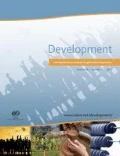Abstract
Successive post-independence governments have embraced women's empowerment in one form or another, either because of their own ideological positioning, or because of demands by their ‘donor friends/partners’ and/or organized domestic groups and NGOs. What has emerged is a varied landscape on women's rights and empowerment work comprising the state bureaucracy, multilateral and bilateral agencies, NGOs, and women's rights organizations, with their accompanying discourses. In the Ghanaian context, Nana Akua Anyidoho and Takyiwaa Manuh look at what the discourses of empowerment highlight, ignore or occlude, the convergences and divergences among them, and how they speak to or accord with the lived realities of the majority of Ghanaian women. Given that the policy landscape in Ghana is highly influenced by donors, they ask which discourses dominate, and how are they used for improving women's lives in ways that are meaningful to them.
Similar content being viewed by others
References
Apthorpe, Raymond (1997) ‘Writing Development Policy and Policy Analysis Plain or Clear: On language, genre and power’, in Cris Shore and Susan Wright (eds.) Anthropology of Policy: Critical perspectives on governance, pp 42–58, London: Routledge.
Batliwala, Srilatha (2007) ‘Taking the Power out of Empowerment – An experiential account’, Development in Practice 17 (4–5): 557–565.
Canadian International Development Agency [CIDA] (2008, December) Gender Equality Strategy – Ghana (Final Draft).
Eyben, Rosalind (2008) ‘Conceptualising Policy Practices in Researching Pathways of Women's Empowerment’, Pathways Working Paper 1 (May).
Eyben, Rosalind and Rebecca Napier-Moore (2008) ‘Choosing Words with Care? Shifting meanings of women's empowerment in international development’, Paper presented at a conference on ‘Pathways of Women's Empowerment: What Are We Learning?’, Cairo, 20–24 January.
Government of Ghana (2004) ‘National Gender and Children Policy’, Accra. Ministry of Women and Children's Affairs.
Government of Ghana (2005a) ‘Strategic Implementation Plan (2005–2008)’, Accra. Ministry of Women and Children's Affairs.
Government of Ghana (2005b) Growth and Poverty Reduction Strategy (GPRS II) (2006–2009). Volume I. Policy Framework, Accra: National Development Planning Commission.
Kabeer, Naila (1994) Reversed Realities- Gender Hierarchies in Development Thought, London: Verso.
Manuh, Takyiwaa (2007) ‘Doing Gender Work in Ghana’, in Catherine Cole, Takyiwaa Manuh and Stephan Miescher (eds.) Africa after Gender? pp 125–149, Bloomington: Indiana University Press.
WiLDAF (2005) ‘Ghana Country Strategic Plan (CSP1) 2005–2010’. Accra: WILDAF- Ghana.
Win, Everjoice J. (2004) ‘Not Very Poor, Powerless or Pregnant: The African woman forgotten by development’, IDS Bulletin 35 (4): 61–64.
World Bank (2006) Gender Equality as Smart Economics’. A World Bank Group Gender Action Plan, Washington D.C.: World Bank.
Additional information
Looks at which discourses dominate, and how are they used for improving women's lives in Ghana
Rights and permissions
About this article
Cite this article
Anyidoho, N., Manuh, T. Discourses on Women's Empowerment in Ghana. Development 53, 267–273 (2010). https://doi.org/10.1057/dev.2010.30
Published:
Issue Date:
DOI: https://doi.org/10.1057/dev.2010.30




